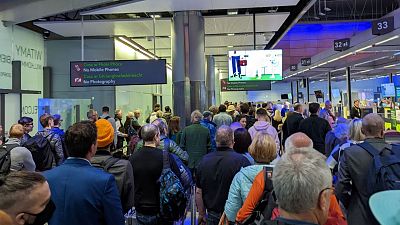According to travel experts, why you shouldn’t cancel your flight this summer

As chaos and queues mount in European airports, passengers are getting nervous.
British searches for ‘cancel my flight’ are at the highest level in a year, after skyrocketing by 163 per cent over the last fortnight.
Searches for ‘refund my flight’ have also increased by 137 per cent, research by Our Woven Journey – a family travel blog – has revealed.
But think twice before you cancel, experts have warned: if you ditch the trip, you’ll probably have to cough up.
Here’s what to do if you’ve got flights booked this summer.
Should I cancel my flight?
If you’ve already booked travel plans, it’s probably best to keep them – though it depends on the airline you are flying with.
Most airlines will charge a hefty cancellation fee if you cancel your flight unless you’ve purchased a refundable option
If, however, your airline scraps the flight, you are legally entitled to a refund. If they cancel less than 14 days before the original trip is scheduled, they have to cover the full cost.
Financial guru Martin Lewis describes the situation as a “game of cat and mouse.”
“If you’re not certain to get a refund, and your trip has not been cancelled by the firm you booked with, don’t make a rash decision and automatically cancel the trip yourself,” he writes on his money saving tips blog.
“That’s because if it later cancels it (given how fluid the situation is, that may yet happen) you’re due a refund.”
However, if you decide you do want to cancel, keep an eye on timings – providers may offer a partial refund before a certain date. You don’t want to miss this deadline.
The UK’s Travel Association (ABTA) has also urged would-be travellers not to cancel their flights.
“While it is really disappointing if you do experience a delay or cancellation, you do have rights, including for a replacement flight or refund, plus significant compensation in most cases when flights are cancelled less than 14 days before departure,” an ABTA spokesperson said.
“If you are thinking of cancelling in advance or postponing your trip, make sure you check the terms and conditions of your booking before doing so as you are likely to incur some costs.”
Will I definitely face travel chaos this summer?
It’s not all doom and gloom. Despite the stressful images of queues and packed departure halls circulating on social media, many airlines and airports are operating relatively smoothly.
“The vast majority of people who had booked to travel over the last couple of weeks have been able to travel as normal and we expect that to be the case for the summer,” an ABTA spokesperson said.
Travel agency InteleTravel echoed this positive assessment of the situation, encouraging travellers to hold on to their tickets.
“The disruption at airports has been distressing for all those involved and our sympathies are with them,” said InteleTravel UK director Tricia Handley-Hughes.
“However, it is important to remember that there are still thousands of flights departing as planned and we encourage customers to continue with their holiday plans and to check the situation with their travel provider.”
Flight-free alternatives this summer
If you haven’t already booked a flight, why not consider other options?
You wouldn’t be alone. Advantage Travel Partnership has revealed that one-third of calls to its members were from customers anxious about travel.
“Understandably customers are concerned about being able to travel without incident in the immediate future and in the summer. The current situation is damaging still-fragile customer confidence,” leisure director Kelly Cookes told Travel Weekly.
Luckily, there are other options. With a rail network stretching more than 200,000 km, Europe is a paradise for train travellers.
Why not check out Italy or Spain through a train window?
It’s better for the planet, too – according to the European Environment Agency, rail travel accounts for 14 grams of CO2 emissions per passenger mile. Air travel generates 285 grams over the same distance.
